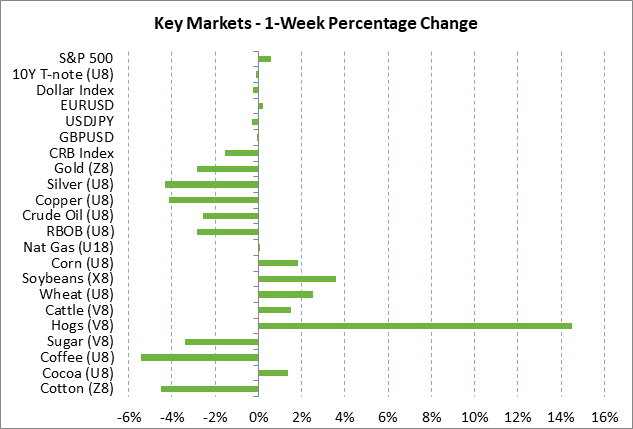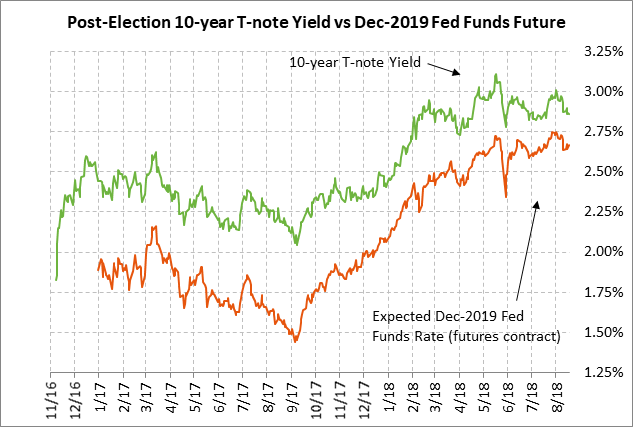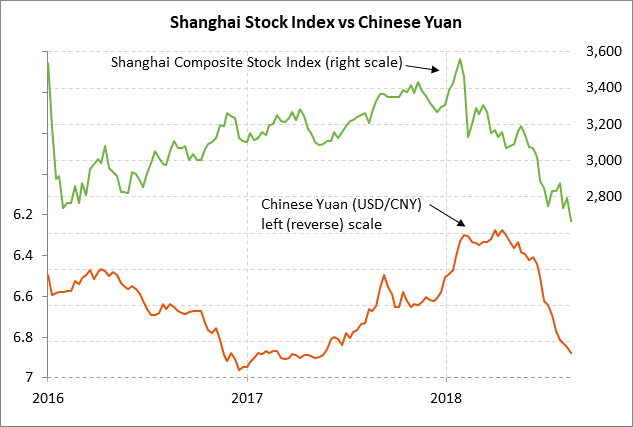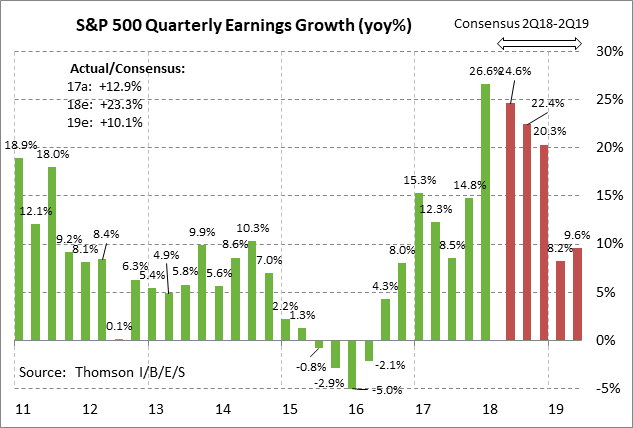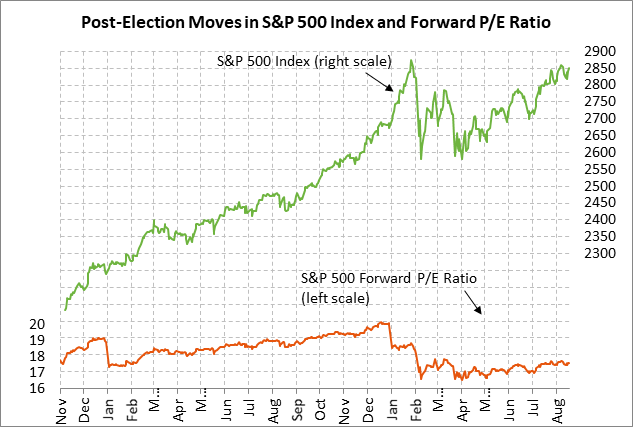- Weekly market focus
- This week’s US/Chinese trade negotiations could delay Thursday’s implementation of tariffs on $16 billion of goods
- New U.S. sanctions on Turkey are possible this week as Turkey still refuses to release the American pastor
- Positive Q2 earnings season winds down
Weekly market focus — The U.S. markets this week will focus on (1) whether mid-level US/Chinese trade negotiations on Wednesday and Thursday produce any progress, (2) whether President Trump this week levies any new sanctions on Turkish President Erdogan’s government for still refusing to release American pastor Brunson, (3) this week’s Fed Jackson Hole conference and Fed Chair Powell’s speech on Friday, (4) the Treasury’s sale of 5-year TIPS on Thursday, (5) the wind-down of Q3 earnings season with only 18 of the S&P 500 companies scheduled to report, and (6) a light economic calendar with the main events including Wednesday’s FOMC minutes, housing reports on Wednesday and Thursday, and July durable goods orders on Friday.
In Europe, the focus will be on Thursday’s Eurozone Aug manufacturing PMI (expected unchanged at 55.1) and Thursday’s ECB July 26 meeting minutes. The European markets will continue to closely watch the Turkish situation, which has been a big negative factor for European banks. The European markets are also keeping a close eye on Brexit and Italy’s budget process.
In Asia, the focus will mainly be on the Chinese markets ahead of this week’s US/Chinese trade talks. The Shanghai Composite index last Friday fell to a new 2-1/2 year low and showed a sharp -4.52% weekly decline. By contrast, the Chinese yuan last Friday edged to a new 1-week high against the dollar on speculation that the Chinese government wants to push the yuan higher ahead of this week’s US/Chinese trade talks. Trump administration officials have complained about the -7.5% loss in the yuan seen in the last two months, which has reduced the negative impact of U.S. tariffs on Chinese exporters.
This week’s US/Chinese trade negotiations could delay Thursday’s implementation of tariffs on $16 billion of goods — U.S. and Chinese officials will hold mid-level trade talks on Wednesday and Thursday. The Wall Street Journal last Friday reported that the talks are meant to lay the foundation for a possible US/Chinese trade agreement to be approved by Presidents Trump and Xi at multi-lateral summits this autumn.
The week’s Chinese delegation will be led by China’s Vice Commerce Minister Wang Shouwen, who is responsible for China’s worldwide trade negotiations. The U.S. side will be led by Treasury undersecretary David Malpass. The odds of success are significantly lower if the Treasury excludes from the talks trade-hawks USTR Lighthizer and White House trade advisor Navarro, who have substantial influence with President Trump.
China may have timed this week’s talks to try to convince the Trump administration to delay the scheduled implementation on Thursday (Aug 23) of a 25% tariff on $16 billion of Chinese goods. However, Chinese officials will have to bring some big concessions if they hope to get a delay in Thursday’s tariffs and an agreement to begin formal negotiations. The Trump administration this week is also scheduled to hold a public hearing on its proposed 25% tariff on $200 billion of Chinese goods that could take effect after the public comment period ends on Sep 5.
New U.S. sanctions on Turkey are possible this week as Turkey still refuses to release the American pastor — Treasury Secretary Mnuchin said last Thursday that the Treasury will slap sanctions on more Turkish government officials if Turkey does not quickly release American pastor Andrew Brunson. Those new sanctions could come as early as this week.
The U.S. has already slapped sanctions on Turkey’s Justice and Interior ministers and has doubled tariffs on Turkey’s steel and aluminum. Turkish President Erdogan last week responded by slapping retaliatory tariffs on up to $1.8 billion of U.S. goods and calling for a public boycott of U.S. electronics such as iPhones.
The Turkish lira last Friday fell -3.15% and brought the 3-session recovery rally to a halt. The lira last Friday closed +17% above last Monday’s record low but is still down by -58% year-to-date. The lira has recovered mainly due to measures by Turkish officials to make it more difficult to short the lira and to push short-term bank financing rates higher by about 300 bp. However, the lira is subject to a renewed sell-off since the Turkish central bank refuses to raise its official policy rate and since Turkish fundamentals remain grim with high inflation, a huge current account deficit, high external debt, and low foreign currency reserves.
Elsewhere in the emerging markets, Venezuela is implementing a massive devaluation of some 95% from official currency rates effective today. The devaluation is causing chaos across Venezuela’s already-devastated economy.
Positive Q2 earnings season winds down — There are only 18 of the S&P 500 companies that report earnings this week with a focus on big retailers like Kohl’s, Target, TJX, Target, L Brands, Ross Stores, and The Gap. Other reports include Lowe’s on Wednesday and Intuit and HP on Thursday.
S&P 500 earnings growth in Q2 was very strong at +24.6%, just below Q1’s +26.6% pace. Looking ahead, earnings growth is expected to remain above 20% in the second half of this year at +22.4% in Q3 and +20.3% in Q4, according to Thomson I/B/E/S. On a calendar year basis, the consensus is for very strong SPX earnings growth this year of +23.3%. Earnings growth is then expected to decelerate to +10.1% in 2019 as the effects from the Jan 1 tax cut start to wear off.

